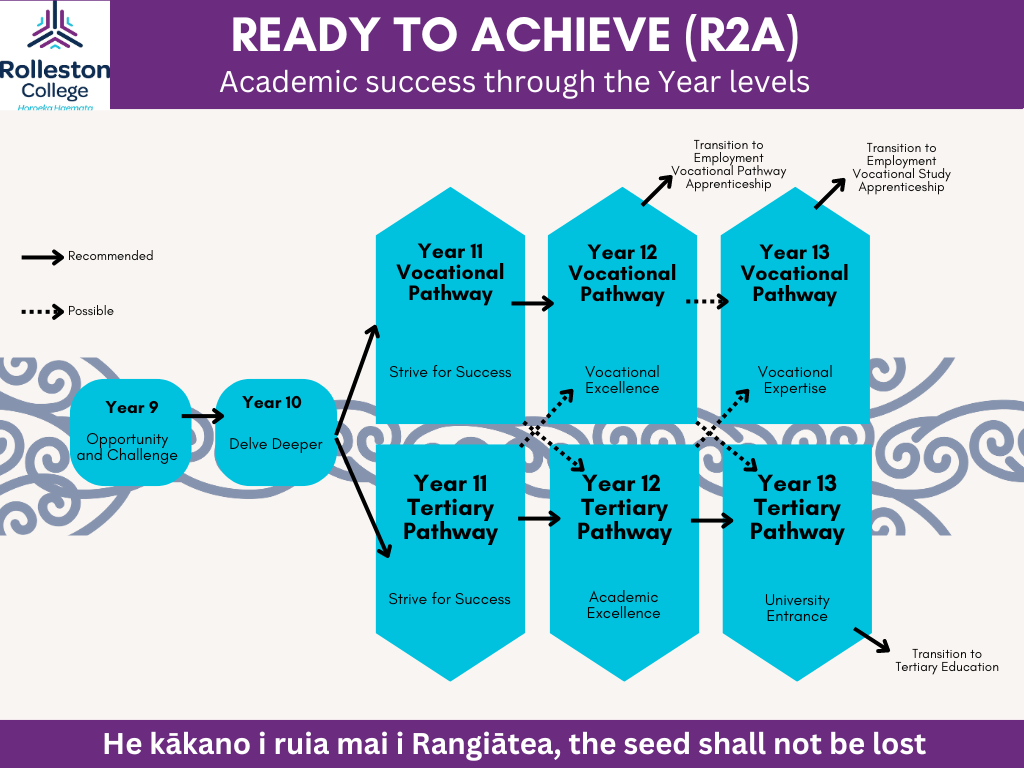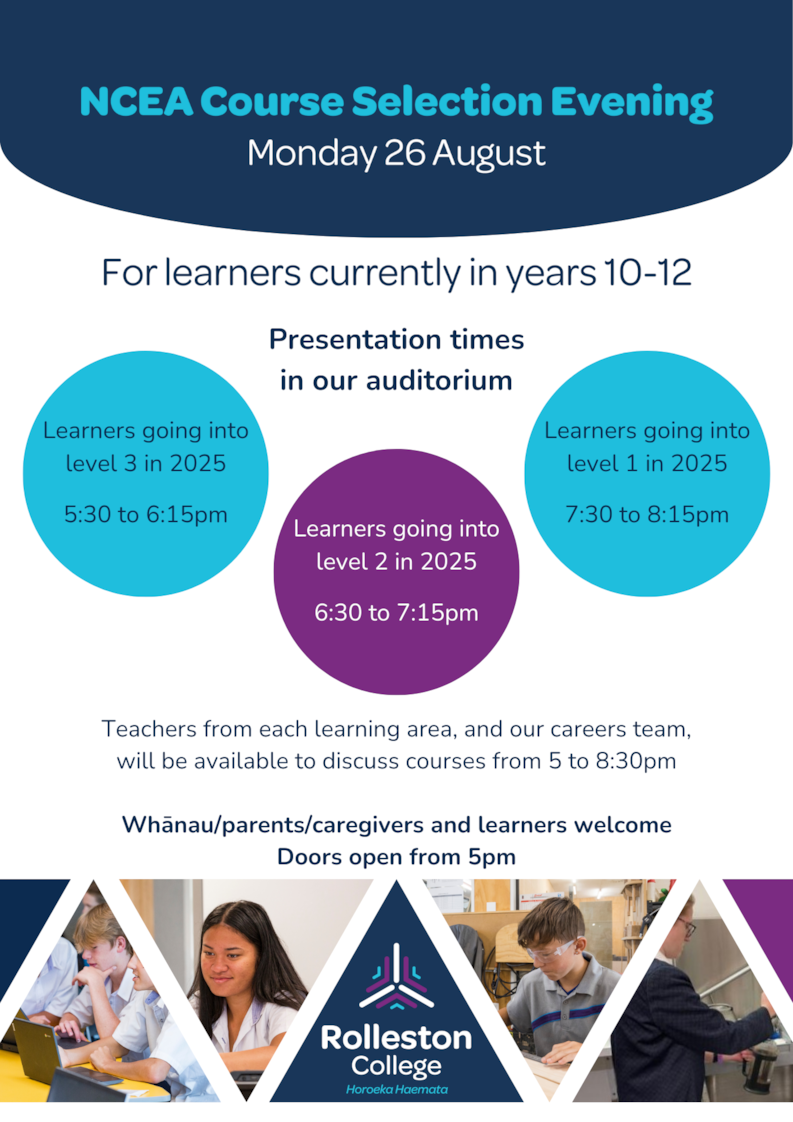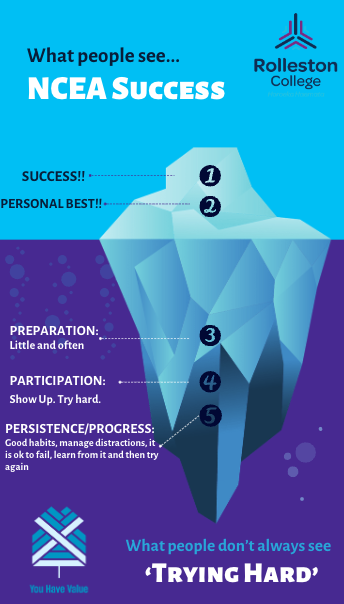 |
Tēnā koutou e te whānau, Nau mai, haere mai, and welcome to our special academic edition. The purpose of this edition is to focus on academic pathways leading up to 2025 subject selection. Please read the information carefully and discuss the different options with your class teachers, Ako/Advisory coaches, parents and our careers team if necessary. For a full list of staff and their contact details, visit Our People on our website. You will find important reminders about our upcoming derived grade examinations at the bottom of this newsletter, so please read it all!
Success through the yearsRead our academic vision for each year level. |
 |
Course selectionWe encourage you to attend the NCEA course selection evening on Monday 26 August. The presentation for learners going into year 11 NCEA Level 1 starts at 7:30pm, year 12 NCEA Level 2 starts at 6:30pm, and year 13 NCEA Level 3 starts at 5:30pm. You are welcome to arrive earlier to speak with teachers and the careers team. |
 |
Course siteOur 2025 course site details all courses available at Rolleston College. Click on the course title and then expand by clicking on the <> to get detailed information. Look carefully at what each course is about and which skills learners need to be successful in that course. If a learner is uncertain whether they should take a course, they should discuss this with their Ako/Advisory coach. SchoolPointLearners must be signed into SchoolPoint in order to choose their courses. How-to guide for year 10 learners selecting year 11 courses. How-to guide for year 11 and 12 learners selecting year 12 and 13 courses. Vocational AcademyOur Vocational Academy is for learners who are ready to start training towards their career choice. Vocational training is practical and hands-on, complemented by the key literacy and numeracy skills to support this training. Learners will take a combination of compulsory and ‘own choice’ subjects. Level 1: This course focuses on the development of skills needed in the workplace through a teacher-guided programme. A variety of practical learning (this could be short courses, work experience or one day per week) and theory in the classroom form the basis of this course. It is a unit standard course and feeds into Level 2 Employment Skills and Gateway, as well as supporting transition from school to the workplace. Recommended entry criteria: Learners will be advised if this course suits their needs. Level 2: The year 12 Vocational Academy is an alternative pathway for learners seeking a more direct transition to further training and employment. Learners will take a combination of compulsory, work experience/dual course (one day per week) and selected courses. Learners will work through a number of unit standards to gain Level 2. Recommended entry criteria: Learners apply in consultation with Advisory/Ako coaches and our careers team. This pathway is designed for learners who plan on moving onto a beyond-school pathway at the end of year 12. Learn more about vocational careers. If you think the Vocational Academy might be a good option for your child, please complete our expression of interest form. TimelineLearners can "favourite" courses they are interested in now by signing into SchoolPoint and clicking on the Course Selection Homepage icon. After the NCEA evening on Monday 26 August, learners will be able to select courses on SchoolPoint and need to complete this by Friday 6 September. Learners are not guaranteed entry to all the courses they select on SchoolPoint – this is why selecting ‘back-up’ courses is important. Priority is not given to learners who select first, so please take your time to consider the best course choices for your child, their interests and abilities. NCEA: literacy and numeracyFrom 2024, to gain an NCEA qualification, students need to achieve a 20-credit co-requisite using:
Students achieve these credits by sitting external Common Assessment Activities (CAAs). Learn more about these assessments on the NZQA website. Learners are given the opportunity to sit these exams from year 9. They only need to meet the Literacy and Numeracy, or Te Reo Matatini and Te Pāngarau, requirement once. After meeting the requirement, it counts for every level of NCEA.
NCEA: Level 1, 2 and 3Qualification: NCEA Level 1, 2 and 3How to achieveLevel 1: 60 credits at any level (1, 2 or 3) Level 2: 60 credits at level 2 or above Level 3: 60 credits at level 3 or above You only need to achieve Literacy or Te Reo Matatini, and Numeracy or Te Pāngarau credits ONCE. Certificate endorsement: recognising high achievementWhen learners perform consistently above the Achieved level, their results can be 'endorsed' to reflect that high achievement. Endorsement is shown on a learner's NZQA Record of Achievement and can be a point of difference when applying for tertiary study, scholarships and halls of residence. Excellence endorsement The NCEA certificate will be endorsed with Excellence if 50 or more credits are earned at Excellence. Merit endorsementThe NCEA Certificate will be endorsed with Merit if 50 credits or more are earned at Merit or Excellence. Credits earned can count towards an endorsement over more than one year. However, they must be gained at the same level of the certificate. For example, Level 2 credits will count towards endorsement of a Level 1 NCEA certificate if gained in the same academic year, but Level 1 credits will not count towards endorsement of a Level 2 NCEA. Course endorsementExcellence endorsement A course will be endorsed with Excellence if 14 or more credits are earned in the course within a school year. Merit endorsementA course will be endorsed with Merit if 14 credits or more are earned in the course within a school year. Learners also need
There are exemptions for Levels 2 and 3 Physical Education, Religious Studies, New Zealand Sign Language, Level 3 Visual Arts, and Te Marautanga o Aotearoa in domains without externally assessed standards. Learn more about endorsement on the NZQA website.
New Zealand University EntranceAdmission requirements for university University Entrance (UE) is the minimum requirement to go from school to a New Zealand university. Achieving University Entrance also opens doors to tertiary study in other countries. Once you have met the requirements for University Entrance, it will appear on your Record of Achievement. How to achieveYou need:
ScholarshipsYear 12 and 13 learners are encouraged to apply for tertiary scholarship to financially assist their next steps. Find details about different scholarships and how to apply on this government website. Locally, scholarships are available from Selwyn District Council, Selwyn and Rolleston Lions and Rolleston Rotary Club. Learners have details on these scholarships and how to apply.
Learning supportLearning support is available for diagnostic assessment, applying for special assessment conditions with NZQA, supporting students with reader/writers in assessment, and providing small group learning support and tuition to students that struggle with literacy, numeracy, or other aspects of their learning. The team encompasses our school whakataukī, He kākano i ruia mai i Rangiātea – The seed will not be lost, into our daily support of learners at our kura. Learning support leader: Amy Howley Learning support coordinator: Lisa Crawford SENCo: Donna Nichol ORS specialist teachers: Deborah Dunlop-Stenhouse and Jessica Love Our classroom teachers are supported by our awesome team of kaiwhakatere/teacher aides. If you have any questions or concerns around the individualised support options please email LS@rollestoncollege.nz.
Be a "try-hard" |
 |
Try hard… it’s actually a good thing, right? We’re not sure why it’s become an insult so we’re on a mission to claim the words back! Personally, we love it when our barista tries hard, when our doctors try hard and when our pilots try hard. How about you? Putting in the work now will help learners to achieve their academic goals – both in the derived grade, and end of year NCEA exams. In previous editions, we have discussed how to best use your time by creating a study timetable and how to set up a space at home that supports study and is away from distractions. PREPARATION: “try hard” by ensuring you have created your study timetable and are sticking to it! Share your study timetable with family so they can support you to stick to it. Organise your notes and practice as many past papers as possible. Be sure to also attend the many tutorials on offer by your teachers. PARTICIPATION: “try hard” by turning up in plenty of time for your exams and giving yourself plenty of time for internal assessments. PROGRESS: “try hard” by taking on board the feedback your teachers will give you following the exam/internal – this is really helpful to progress your learning! PERSONAL BEST: “try hard” to reach your goals and it will take you one step closer to your future career!
Derived grade examinationsOur derived grade exams start this Friday! You can find all of the information about exams on our website (including the exam timetable). Here are some key reminders:
Key datesTerm three Friday 23 to Friday 30 August: Year 11-13 derived grade exams Term four Week 3: Year 11-13 senior R2A report emailed to parents/caregivers |
 |